New Deal
fostering innovation and economic growth
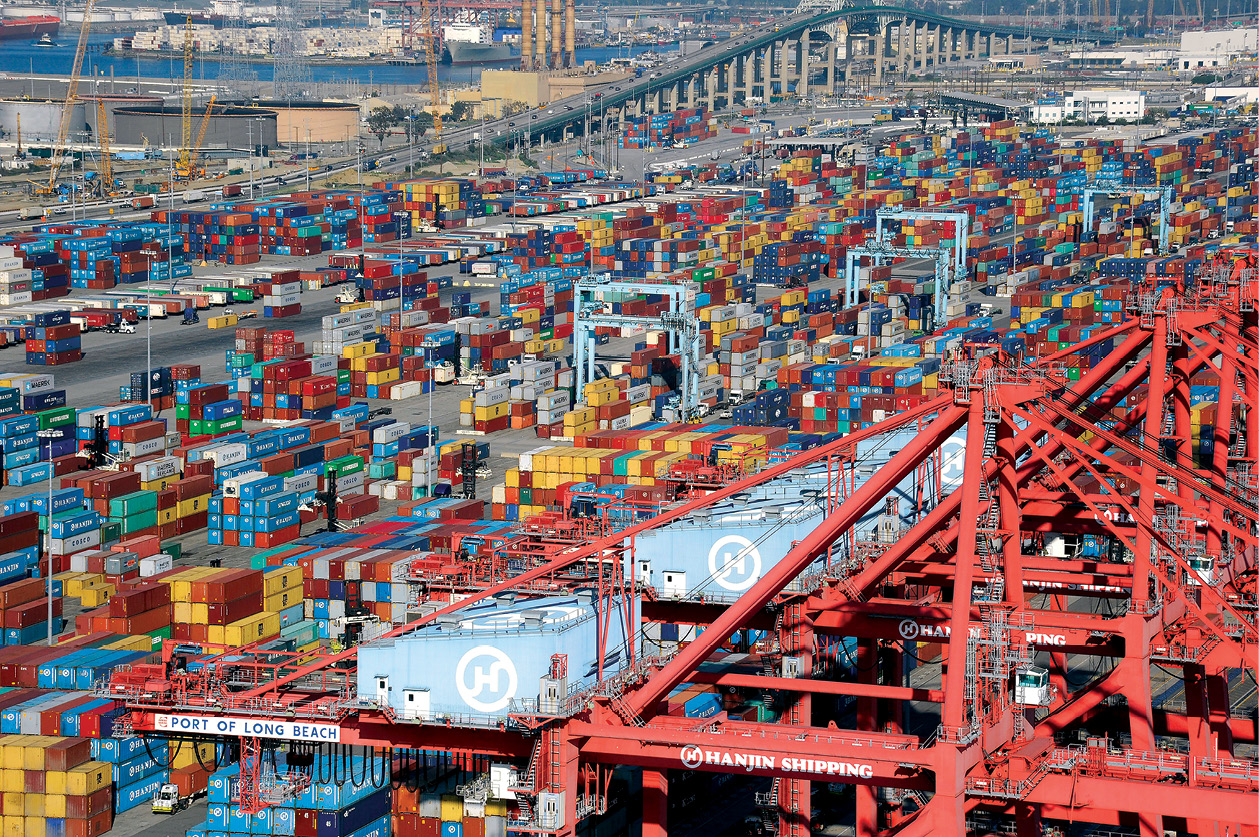
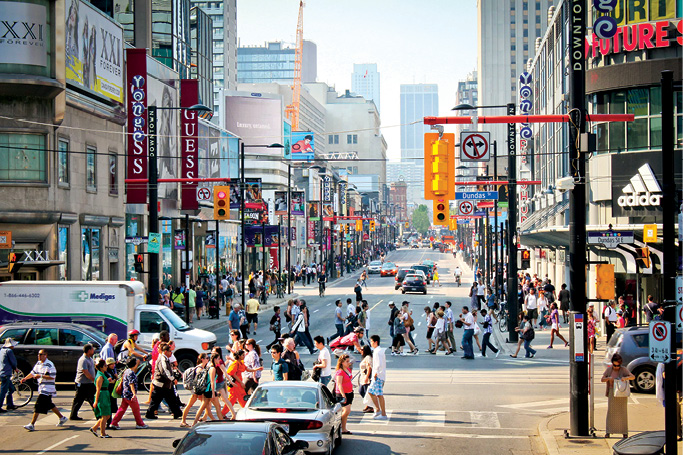
prosperity doesn’t just happen. it depends on many crucial economic drivers.
The vital interplay of innovation, trade, finance and global markets continues to be a focal point for teaching, research and policy engagement across the Munk School. Typical of our multidisciplinary approach is the Innovation Policy Lab, recognized globally as a hub for investigation.
Education
In
Action
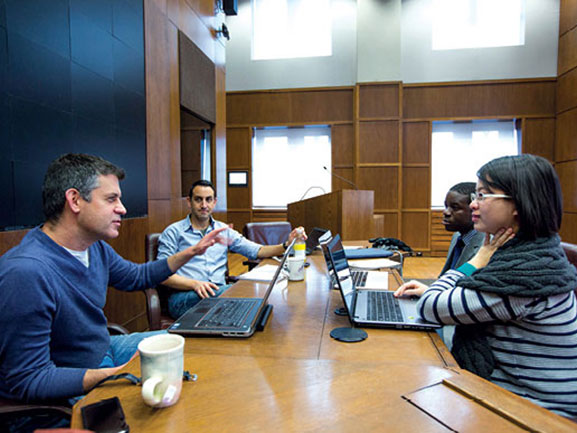
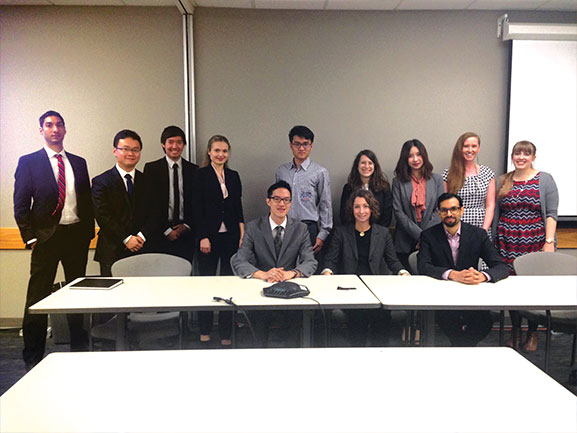
The Global Stage
Many students, as they prepare for professional careers, have big ideas for changing the world. But few have a chance to see those ideas actually implemented by governments around the globe, from Ireland to Israel to Mexico.
This is the unique opportunity at the heart of Innovation, Institutions, Governments and Growth, a course offered in the final semester of the Munk School’s MGA program. Led by Prof. Dan Breznitz, Co-Director of the Innovation Policy Lab, students begin by exploring various approaches to innovation and entrepreneurship worldwide. They then integrate theory with practice by helping to develop unique projects outside Canada, working directly with local government agencies.
Launched three years ago, this hands-on course focused in 2015–2016 on the innovation economy in Israel. Students collaborated with senior researchers from the Office of the Chief Scientist on finding new ways to deploy technology in the delivery of social services. The previous year’s course leveraged ongoing work in the Mexican state of Jalisco, a centre of innovation that hopes to follow the model of Silicon Valley. Students developed proposals on everything from strengthening government support for technology startups to strategies for enhancing social well-being, and several presented reports at a government policy forum in Guadalajara, the state capital.
“Your support in helping to reinforce our relationship with the Jalisco state government... provided us with a platform that we have been able to leverage to explore future collaborations. Thank you for the constructive and collaborative approach between our two teams to help build trade opportunities, jobs and economic growth for Ontario.”
– David Barnes, Ontario Ministry of Citizenship, Immigration and International Trade
“It was a stepping stone to understanding how social innovation can solve problems in the private, public and not-for-profit sectors,” says Haleigh King, who graduated from the MGA program in 2015 and now works for the social enterprise Textbooks for Change. “The experience of working with a client on a relevant topic gave me a competitive edge when entering the workforce.”
Capping Achievements
Creating an energy innovation policy. Rethinking how governments and charities fund social programs. Developing regional strategies to attract foreign direct investment. Fostering economic development by leveraging the Internet of Things. These are some of the Capstone Projects undertaken in 2015–2016 by second-year MGA students investigating issues of innovation policy and economic growth. Under the guidance of Prof. Shiri Breznitz, students had the opportunity to work on problems with clients from the Ontario Ministry of Economic Development, Employment and Infrastructure, and from the MaRS Discovery District.
Learning to Change
Several hundred million people around the world can access information anytime using their digital tablets. Another few hundred million do not have access to clean drinking water. What causes such disparities – and more importantly, how do we eliminate them? First-year undergraduate students in the Munk One program tackle such questions in an introductory course that explores the disturbing facts of global inequality and the search for a sustainable balance between the drive for invention and the desire to serve the public good.
Research
Leadership

The Future of Fintech
In November 2015 the Munk School’s Innovation Policy Lab released an in-depth report on Toronto’s emerging financial services technology (“fintech”) sector. Commissioned by the Toronto Financial Services Alliance, the report concludes that despite increased activity in the sector, the lack of a cohesive fintech ecosystem is inhibiting regional economic growth. “We have most of the right ingredients, but we’re operating far below our real potential,” says Prof. Dan Breznitz, who collaborated on the study with Prof. David Wolfe, his Co-Director at the Innovation Policy Lab. “On a global basis, Toronto’s fintech growth is falling behind other cities such as New York and London.”
The report states that Canadian fintech firms, lacking strong links with financial institutions, are becoming innovative disruptors, creating products and services that compete with those of banks. Canada’s regulatory environment, which provided protection during the crisis of 2007–2008, has also made banks slow to react to the emerging fintech challenge. Toronto needs the affordable, industry-funded incubators of other financial centres, as well as more government funding. “The findings are a call to action,” says Prof. Wolfe. “The impact of not grasping the opportunity could be a slow decline in relevance of the financial services and fintech sectors in the Toronto region.”
Let’s Get Digital
Over the past year, the Research Partnership on the Digital Economy continued to push forward its landmark project launched in 2014 under the banner Creating Digital Opportunity. Uniting Munk School researchers with colleagues from 16 universities and 12 partner organizations – thanks to support from the Social Sciences and Humanities Research Council of Canada – the project informs policy-makers’ efforts to strengthen Canada’s international competitiveness and reshape the political economy for the digital age.
Other recent work in this area includes “A Policy Agenda for the Digital Economy,” presented by Prof. David Wolfe to senior officials with Innovation, Science and Economic Development Canada as part of an ongoing collaboration on the country’s innovation agenda. And the role of university-based research in fostering innovation was examined in a new book of essays, University Technology Transfer: The globalization of academic innovation, co-edited by Prof. Shiri Breznitz.
Big Data, Bright Cities
Mark Kleinman, Director of Economic and Business Policy for the Greater London Authority and a visiting scholar at the Institute on Municipal Finance and Governance, has published a widely read paper, “Cities, Data and Digital Innovation,” comparing recent “smart city” initiatives in Toronto and London, England. His work has been credited by senior policy-makers with advancing the conversation around harnessing big data to build public engagement, improve transparency and accountability, deliver higher-quality services at lower costs, and drive economic growth.
The use of data-driven insights to address urban challenges is also the focus of a new course called Big Data and Global Cities, offered jointly to students in the MGA program and the University of Toronto Faculty of Engineering.
Who’s Behind the Wheel?
David Ticoll, a Distinguished Senior Fellow at the Innovation Policy Lab, published a new report in 2015 entitled “Driving Changes: Automated Vehicles in Toronto.” It is the first city-focused North American study to examine policy and planning issues around self-driving cars.
Public
Engagement
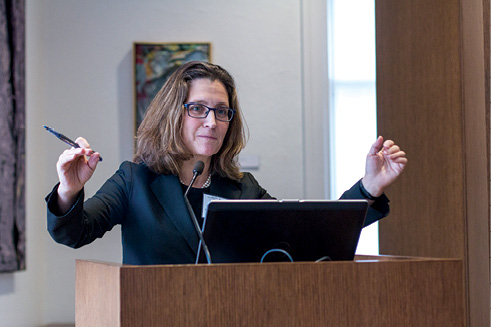
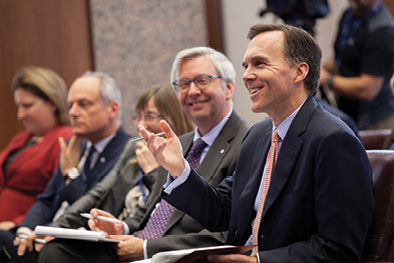
What TTP Spells for Canada
In the fall of 2015 The Hon. Chrystia Freeland, Minister of International Trade in the newly elected government of Prime Minister Justin Trudeau, approached the Munk School and the University of Toronto Faculty of Law for help in evaluating the impact of the Trans-Pacific Partnership (TPP) – the complex 12-nation trade treaty agreed to in principle by the previous Conservative government. The TPP was negotiated with unprecedented secrecy, and when the full text was finally released after the swearing-in of the new federal cabinet, it was the first opportunity for Canadians to begin assessing its impact on everything from the flow of global commerce to the cost of regulatory change.
At the request of the Minister and her parliamentary secretary, Liberal MP David Lametti, the Munk School and the Faculty of Law convened a conference entitled “The Trans-Pacific Partnership: Options for Canada and the World” in January 2016. Bringing together leading Canadian and U.S. experts, the daylong workshop covered topics ranging from the TPP’s broader impact on Canada’s economic future to specific issues such as conflicts with constitutional law and the possible erosion of intellectual property rights.
“I felt I needed to be informed by the academic community’s thinking on trade issues,” Ms. Freeland said in her opening remarks, recalling how she’d arranged a meeting at the Munk School within days of assuming her cabinet post. “At the end of the meeting I said, ‘Okay, that was a good start. But within four weeks I’d like you guys to organize something international.’ And they’ve done it.”
“At the end of the meeting I said, ‘Okay, that was a good start. But within four weeks I’d like you guys to organize something international.’ And they’ve done it.”
– The Hon. Chrystia Freeland
Cabinet Consultations
As part of a nationwide consultative process in preparing for the next federal budget, Canada’s Minister of Finance, The Hon. Bill Morneau, met in January 2016 with leaders from diverse sectors at an event hosted at the Munk School by the Public Policy Forum. Participants shared their views on how the federal government could work to ensure robust and inclusive economic growth while addressing challenges such as climate change, infrastructure renewal and fostering innovation to boost competitiveness.
Mr. Morneau’s cabinet colleague The Hon. Navdeep Bains, Minister of Innovation, Science and Economic Development, also sought insights from members of the Innovation Policy Lab as he took on his new portfolio.

